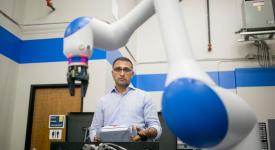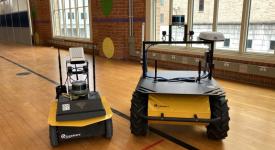Yaskawa Partnership Accelerates Robotics Research at The University of Texas at Austin

04/05/2021 - Yaskawa, a global manufacturer of servos, motion controllers, AC motor drives, switches, and industrial robots, is establishing a partnership with The University of Texas at Austin. This partnership is marked with a gift of a dual-arm, SDA10F robot that will be available for the use of the Texas Robotics faculty. The partnership aims to facilitate interdisciplinary research and innovation within the robotics community in the university.












